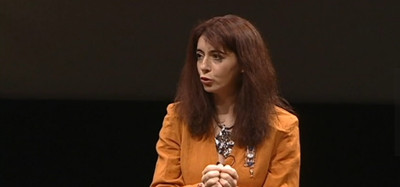If we see someone in a wheelchair, we assume they cannot walk.
當我們看到有人坐在輪椅上,我們就認為他們不會走路。
It may be that they can walk three, four, five steps. That, to them, means they can walk.
或許,事實上他們可以走上好幾步。 而這,對他們來說,意味著。
In a year's time, it could be two extra steps.
或許一年以后,他們可以一次多走兩步。
In another year's time, three extra steps.
再過一年,他們可以多走三步。
Those are hugely important aspects to think about.
這其實是很值得好好思考的地方。
So when we do listen to each other,it's unbelievably important for us to really test our listening skills,to really use our bodies as a resonating chamber, to stop the judgment.
因此,當我們真正彼此傾聽的時候,我們應該先測測自己傾聽的本領,真正地把我們的身體作為共鳴腔。 停止表面的判斷。

For me, as a musician who deals with 99 percent of new music,it's very easy for me to say, "Oh yes, I like that piece.
對我來說,作為一個99%都在與新音樂打交道的音樂家,要說出噢,對,我喜歡這首。
Oh no, I don't like that piece." And so on.
噢,不,我不喜歡那首?!钡鹊冗@樣的話是很容易的事。
And you know, I just find that I have to give those pieces of music real time.
但我發現我應該給與那些音樂更多時間的關注。
It may be that the chemistry isn't quite right between myself and that particular piece of music,but that doesn't mean I have the right to say it's a bad piece of music.
有可能,僅僅是我和那首歌之間并沒有很好的化學反應,但這并不代表著我有權利評價,這不是首好曲子。
And you know, it's just one of the great things about being a musician,is that it is so unbelievably fluid.
其實,這是作為音樂家感覺最棒的一點,是種讓人難以想象的液體。
So there are no rules, no right, no wrong, this way, that way.
因此,沒有規則,沒有對錯,沒有這樣那樣的方式。
If I asked you to clap -- maybe I can do this.
如果我讓大家發出拍擊聲,或許我可以這么做。
If I can just say, "Please clap and create the sound of thunder.
如果我說:請大家發出拍擊聲。發出打雷般的聲音。
I'm assuming we've all experienced thunder.
假設大家都知道打雷是怎樣的聲音。
Now, I don't mean just the sound;I mean really listen to that thunder within yourselves.
現在,我說的不是聲音本身,我所說的意味著真正地全身心地去聽雷聲。











